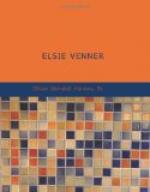After school was done, she finished the talk with the master which had been so suddenly interrupted. There were things spoken of which may prove interesting by and by, but there are other matters we must first attend to.
CHAPTER VII.
The event of the season.
“Mr. and Mrs. Colonel Sprowle’s compliments
to Mr. Langdon and requests the pleasure of his company
at a social entertainment on Wednesday evening next.
“Elm
St. Monday.”
On paper of a pinkish color and musky smell, with a large “S” at the top, and an embossed border. Envelop adherent, not sealed. Addressed
Langdon Esq.
Present.
Brought by H. Frederic Sprowle, youngest son of the Colonel,—the H. of course standing for the paternal Hezekiah, put in to please the father, and reduced to its initial to please the mother, she having a marked preference for Frederic. Boy directed to wait for an answer.
“Mr. Langdon has the pleasure of accepting Mr. and Mrs. Colonel Sprowle’s polite invitation for Wednesday evening.”
On plain paper, sealed with an initial.
In walking along the main street, Mr. Bernard had noticed a large house of some pretensions to architectural display, namely, unnecessarily projecting eaves, giving it a mushroomy aspect, wooden mouldings at various available points, and a grandiose arched portico. It looked a little swaggering by the side of one or two of the mansion-houses that were not far from it, was painted too bright for Mr. Bernard’s taste, had rather too fanciful a fence before it, and had some fruit-trees planted in the front-yard, which to this fastidious young gentleman implied a defective sense of the fitness of things, not promising in people who lived in so large a house, with a mushroom roof and a triumphal arch for its entrance.
This place was known as “Colonel Sprowle’s villa,” (genteel friends,)—as “the elegant residence of our distinguished fellow-citizen, Colonel Sprowle,” (Rockland Weekly Universe,)—as “the neew haouse,” (old settlers,)—as “Spraowle’s Folly,” (disaffected and possibly envious neighbors,)—and in common discourse, as “the Colonel’s.”
Hezekiah Sprowle, Esquire, Colonel Sprowle of the Commonwealth’s Militia, was a retired “merchant.” An India merchant he might, perhaps, have been properly called; for he used to deal in West India goods, such as coffee, sugar, and molasses, not to speak of rum,—also in tea, salt fish, butter and cheese, oil and candles, dried fruit, agricultural “p’doose” generally, industrial products, such as boots and shoes, and various kinds of iron and wooden ware, and at one end of the establishment in calicoes and other stuffs,—to say nothing of miscellaneous objects of the most varied nature, from sticks of candy, which tempted in the smaller youth with coppers




